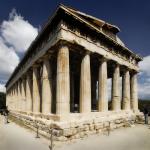|
This section contains 501 words (approx. 2 pages at 300 words per page) |

|
Flourished Circa Eighth Century B.C.E.
Poet
Significance. Along with Homer, Hesiod is the oldest extant Greek poet. Scholars have no clear evidence about his date, nor did the ancients: a much-debated topic was his chronological relationship with Homer, with many believing in Hesiod's priority. Yet, unlike Homer, Hesiod reveals something of his life and family in his poetry, and his is the first distinctively individual voice in European literature. Hesiod's father came from Cyme on the coast of Asia Minor and moved to the village of Ascra by Mt. Helicon in Boeotia. It was on the slopes of Helicon while he was shepherding that Hesiod claims the Muses appeared to him, gave him a laurel branch, and instructed him to sing. Of course he followed their command, and elsewhere tells us that he won a tripod in a singing competition held at a funeral at...
|
This section contains 501 words (approx. 2 pages at 300 words per page) |

|




